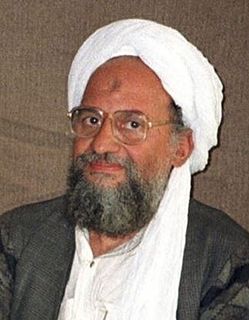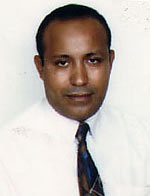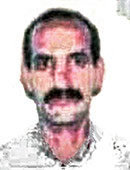Related Research Articles

Ayman Mohammed Rabie al-Zawahiri is an Egyptian terrorist known for being the leader of terrorist group al-Qaeda since June 2011, succeeding Osama bin Laden following his death, and is a current or former member and senior official of Islamist organizations which have orchestrated and carried out attacks in Asia, Africa, and the Middle East and also some in North America and Europe. In 2012, he called on Muslims to kidnap Western tourists in Muslim countries.

Al-jamāʻah al-islāmīyah is an Egyptian Sunni Islamist movement, and is considered a terrorist organization by the United States, the United Kingdom and the European Union. The group was dedicated to the overthrow of the Egyptian government and replacing it with an Islamic state; the group has committed to peaceful means following the coup that toppled Mohamed Morsi.
Osama bin Laden authored two fatāwā in the late 1990s. The first was published in August 1996 and the second in February 1998. At the time, bin Laden was not a wanted man in any country except his native Saudi Arabia, and was not yet known as the leader of the international terrorist organization al-Qaeda. Therefore, these fatāwā received relatively little attention until after the August 1998 United States embassy bombings, for which bin Laden was indicted. The indictment mentions the first fatwā, and claims that Khalid al-Fawwaz, of bin Laden's Advice and Reformation Committee in London, participated in its communication to the press.

Montasser el-Zayat or Muntasir al-Zayyat is an Egyptian lawyer and author whose former clients, according to press reports, included Ayman al-Zawahiri, since 2011 the leader of al-Qaeda, the terrorist organization, and al-Gama'a al-Islamiyya.
Refa'i Ahmed Taha or Refa'i Ahmed Taha Musa or Ahmed Refa'i Taha, alias Abu Yasser al-Masri was an Egyptian leader of a terrorist component of al-Gama'a al-Islamiyya, having succeeded "The Blind Sheikh" Omar Abdel-Rahman in that role after the latter's arrest in 1993 and imprisonment for life in 1995. He was one of 14 people subjected to extraordinary rendition by the CIA prior to the 2001 declaration of a War on Terror.

Ali Sayyid Muhamed Mustafa al-Bakri alias Abdul-Aziz al-Masri is a member of the Shura Council of the terrorist organization al-Qaeda and a former member of Egyptian Islamic Jihad, from which he migrated to al-Qaeda, along with Ayman al-Zawahiri. Al-Bakri is at large, and the United States Department of State is offering up to US$5 million for information about his location. The State Department wanted poster reads:
Ali Sayyid Muhamed Mustafa al-Bakri is an al-Qaida member and an explosives and chemical weapons expert. He is a member of the al-Qaida Shura council and is a close associate of al-Qaida leaders Saif al-Adel and Ayman al-Zawahiri. Prior to joining al-Qaida, al-Bakri was a member of the Egyptian Islamic Jihad terrorist group, under the direction of Ayman al-Zawahiri. He served as an instructor in al-Qaida's camps in Afghanistan, providing terrorist recruits with training in the use of explosives and chemical weapons. Al-Bakri also unsuccessfully attempted to hijack a Pakistani Air passenger flight in December 2000. It is likely that he continues to train al-Qaida terrorists and other extremists.
Mamdouh Ismail is an Egyptian defence attorney and a former member of "the Jihad group", who since the 1980s has represented various Egyptians accused of terrorism offences in Egypt. He was arrested himself on 29 March 2007 and is now accused of complicity in an "Egyptian project" of al-Qaeda, taking his orders from Ayman al-Zawahiri via Muhammad Khalil al-Hukaymah and Hani al-Sibai. All three—Ismail, al-Sibai, and al-Hukaymah -- deny that charge. Ismail is also charged with incitement. As of late 2011, he was a member of the Authenticity Party.
There have been several video and audio recordings released by Ayman al-Zawahiri. Many of the al-Zawahiri tapes have been released directly to Arabic language satellite television networks, like al Jazeera.
Sayyed Imam Al-Sharif,, aka "Dr. Fadl" and Abd Al-Qader Bin 'Abd Al-'Aziz, has been described as a "major" figure "in the global jihad movement." He is said to be "one of Ayman Al-Zawahiri's oldest associates, and his book al-'Umda fi I'dad al-'Udda, was used as a jihad manual in Al-Qaeda training camps in Afghanistan. Fadl is reported to be one of the first members of Al Qaeda’s top council.
Mahfouz Ould al-Walid, kunya Abu Hafs al-Mauritani, is a Mauritanian Islamic scholar and poet previously associated with al-Qaeda. A veteran of the Soviet–Afghan War, he served on al-Qaeda's Shura Council and ran a religious school called the Institute of Islamic Studies in Kandahar, Afghanistan, from the late 1990s until the American invasion of Afghanistan in 2001.
Carried out by the Egyptian Islamic Jihad, the 19 November 1995 attack on the Egyptian embassy in Islamabad, Punjab, Pakistan was retaliation against the diplomatic staffers who were accused of gathering intelligence on Jihad factions inside Pakistan. It was the deadliest attack against the Egyptian government, since it had been declared apostate three years earlier by Islamic militants.
Ahmad Salama Mabruk, known as Abu Faraj al-Masri, was a senior leader in the Syrian militant group Jabhat Fateh al-Sham, and was previously a leader in Jabhat al-Nusra and the Egyptian Islamic Jihad militant groups. He was present alongside Abu Muhammad al-Julani at the announcement of the creation of Jabhat Fateh al-Sham. He was one of 14 people subjected to extraordinary rendition by the CIA prior to the 2001 declaration of a War on Terror.
Thirwat Salah Shehata was a core member of Egyptian Islamic Jihad.
Muhammad Rabee al-Zawahiri is an Egyptian Islamist who was a member of Egyptian Islamic Jihad and one of 14 people subjected to extraordinary rendition by the CIA prior to the 2001 War on Terror. He is the younger brother of Al Qaeda leader Ayman al-Zawahiri.
Ahmad Ibrahim al-Sayyid al-Naggar was a member of the Egyptian Islamic Jihad, an Islamist terrorist group active since the 1970s. The Jewish lobby group ADL dubbed him the "propaganda chief" of the militant organisation. He was one of 14 people subjected to extraordinary rendition by the CIA prior to the 2001 declaration of a War on Terror.
Muhammad Abdelrahim al-Sharqawi was an alleged member of Egyptian Islamic Jihad and was one of the closest colleagues of Ayman al-Zawahiri. whom he had known since 1968.

Ibrahim Muhammad Salih al-Banna is a citizen of Egypt who security officials suspect is a leader in Al Qaeda in the Arabian Peninsula (AQAP). Security officials have repeatedly claimed to have killed him with missiles launched from unmanned aerial vehicles. An October 2011 claim had al-Banna killed, along with six other individuals, including some who were alleged to have been associated with AQAP and at least one who was not. Ibrahim al-Banna was added to the U.S. State Department's Rewards for Justice wanted list on October 14, 2014.
The Egyptian Islamic Jihad, formerly called simply Islamic Jihad, originally referred to as al-Jihad, and then the Jihad Group, or the Jihad Organization, is an Egyptian Islamist terrorist group active since the late 1970s. It is under worldwide embargo by the United Nations as an affiliate of Al-Qaeda. It is also banned by several individual governments worldwide. The group is a Proscribed Organisation in the United Kingdom under the Terrorism Act 2000.
Abdullah Abd al-Rahman Muhammad Rajab Abd al-Rahman, known as Ahmad Hasan Abu al-Khayr al-Masri, was an Egyptian al-Qaeda leader who has been described as the general deputy to al-Qaeda leader Ayman al-Zawahiri.

Al-Qaedain the Sinai Peninsula, or AQSP, is an Egyptian militant jihadist organization possibly formed by a merger between al-Qaeda operatives in Sinai and Ansar al Jihad. It is Al-Qaeda's branch in the Sinai peninsula, and is composed of many Al-Qaeda factions in the area. Despite sharing similar ideology and possibly some resources, AQSP and the Islamic State have never formally affiliated with one another.
References
- 1 2 3 4 El-Zayyat, Montasser, "The Road to al-Qaeda", 2004. tr. by Ahmed Fakry
- 1 2 3 Higher State Security Court of Egypt, "Confession of Ayman al-Zawahiri: Case #462", 1981.
- ↑ Gerges, Fawaz A. "The Far Enemy", Cambridge University Press, 2005. p. 36
- 1 2 Wright, Lawrence. Kashmir Herald, "Ayman al-Zawahiri: The Man Behind Bin Laden", March 2003
- ↑ al-Zayat, Montasser, "The Road to al-Qaeda", 2002
- ↑ Raphaeli, Nimrod (Winter 2002). "Ayman Muhammad Rabi' Al-Zawahiri: The Making of an Arch Terrorist". Terrorism and Political Violence . 14 (4): 1–22. doi:10.1080/714005636. Cited in "Ayman Muhammad Rabi' Al-Zawahiri". The Jewish Virtual Library. 2003-03-11. Retrieved 2006-08-29.
| This biographical article related to the Egyptian military is a stub. You can help Wikipedia by expanding it. |